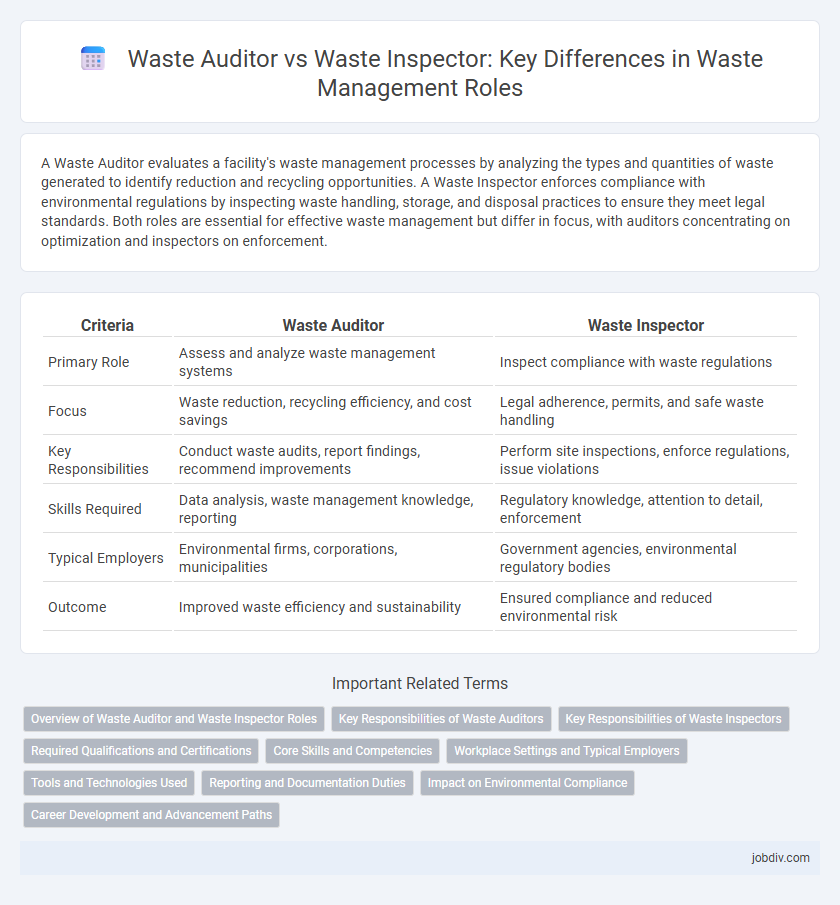A Waste Auditor evaluates a facility's waste management processes by analyzing the types and quantities of waste generated to identify reduction and recycling opportunities. A Waste Inspector enforces compliance with environmental regulations by inspecting waste handling, storage, and disposal practices to ensure they meet legal standards. Both roles are essential for effective waste management but differ in focus, with auditors concentrating on optimization and inspectors on enforcement.
Table of Comparison
| Criteria | Waste Auditor | Waste Inspector |
|---|---|---|
| Primary Role | Assess and analyze waste management systems | Inspect compliance with waste regulations |
| Focus | Waste reduction, recycling efficiency, and cost savings | Legal adherence, permits, and safe waste handling |
| Key Responsibilities | Conduct waste audits, report findings, recommend improvements | Perform site inspections, enforce regulations, issue violations |
| Skills Required | Data analysis, waste management knowledge, reporting | Regulatory knowledge, attention to detail, enforcement |
| Typical Employers | Environmental firms, corporations, municipalities | Government agencies, environmental regulatory bodies |
| Outcome | Improved waste efficiency and sustainability | Ensured compliance and reduced environmental risk |
Overview of Waste Auditor and Waste Inspector Roles
Waste auditors assess and analyze waste streams to identify opportunities for reduction, recycling, and cost savings by examining data and operational practices within facilities. Waste inspectors enforce compliance with environmental regulations, inspecting sites to ensure proper waste handling, storage, and disposal methods are followed according to legal standards. Both roles are crucial for sustainable waste management but focus on different aspects: auditors prioritize optimization and reporting, while inspectors emphasize regulatory adherence and enforcement.
Key Responsibilities of Waste Auditors
Waste Auditors specialize in analyzing waste streams, identifying reduction opportunities, and recommending sustainable waste management practices to improve efficiency and compliance. Their key responsibilities include conducting waste audits, quantifying waste types and volumes, and developing strategies for minimizing waste generation and costs. Waste Inspectors primarily focus on regulatory compliance and enforcement, while Waste Auditors emphasize data-driven waste reduction and resource optimization.
Key Responsibilities of Waste Inspectors
Waste inspectors conduct thorough site assessments to ensure compliance with environmental regulations and proper waste management practices. They identify violations related to hazardous material disposal, document findings, and enforce corrective actions to prevent pollution and protect public health. Regular inspections and detailed reporting are critical responsibilities that support sustainable waste management and regulatory adherence.
Required Qualifications and Certifications
Waste auditors typically require certifications such as Certified Environmental Auditor (CEA) or equivalent credentials in waste management, emphasizing expertise in data analysis and regulatory compliance. Waste inspectors often need formal qualifications including a background in environmental science or engineering, along with certifications like the Hazardous Waste Operations and Emergency Response Standard (HAZWOPER). Both roles demand thorough knowledge of waste regulations, but auditors focus more on evaluating waste generation patterns, while inspectors prioritize compliance verification and site inspections.
Core Skills and Competencies
Waste auditors excel in data analysis, material flow assessment, and sustainability reporting, focusing on identifying waste reduction opportunities through detailed audits. Waste inspectors possess strong regulatory knowledge, compliance enforcement abilities, and inspection techniques to ensure waste handling meets legal and environmental standards. Both roles require attention to detail and expertise in waste management protocols, but auditors emphasize analytical skills while inspectors prioritize inspection and enforcement competencies.
Workplace Settings and Typical Employers
Waste auditors primarily work in corporate workplaces, environmental consultancies, and manufacturing facilities, conducting waste assessments to optimize resource use and reduce disposal costs. Waste inspectors are commonly employed by government regulatory agencies, local authorities, and environmental protection organizations, focusing on compliance monitoring and enforcing waste management laws at commercial, industrial, and municipal sites. Both roles frequently overlap in settings like recycling centers, construction sites, and large-scale waste management operations.
Tools and Technologies Used
Waste auditors utilize data analytics software, handheld scanners, and waste tracking systems to analyze waste composition and identify reduction opportunities. Waste inspectors employ portable testing kits, environmental sensors, and compliance management applications to evaluate waste disposal practices and regulatory adherence. Both roles leverage Geographic Information Systems (GIS) and mobile devices for on-site data collection and reporting, enhancing accuracy and efficiency in waste management.
Reporting and Documentation Duties
Waste auditors primarily focus on analyzing waste generation patterns and creating detailed reports that identify opportunities for waste reduction and cost savings. Waste inspectors emphasize verifying compliance through thorough documentation reviews and on-site assessments to ensure adherence to environmental regulations. Both roles require meticulous record-keeping but differ in their approach: auditors generate strategic waste management reports, while inspectors produce compliance-focused documentation.
Impact on Environmental Compliance
Waste Auditors systematically evaluate waste management processes, ensuring accurate tracking and reporting of waste generation, segregation, and disposal to enhance environmental compliance. Waste Inspectors conduct on-site inspections to verify adherence to environmental regulations, identifying violations and enforcing corrective measures to prevent contamination and pollution. Both roles are critical in maintaining regulatory standards, but auditors emphasize process optimization while inspectors focus on enforcement and compliance verification.
Career Development and Advancement Paths
Waste auditors analyze waste management processes to identify inefficiencies and ensure regulatory compliance, often advancing into roles such as sustainability consultants or environmental managers. Waste inspectors enforce environmental regulations by conducting site inspections and ensuring adherence to waste disposal laws, with career progression leading to supervisory or regulatory agency positions. Both careers offer pathways to specialized expertise in environmental policy, compliance, and operational management within the waste management sector.
Waste Auditor vs Waste Inspector Infographic

 jobdiv.com
jobdiv.com